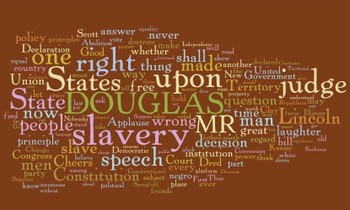Listening tonight to the McCain/Obama debate (nicely moderated by Bob Schieffer, Old School) reminds me of other political debates. This one at least was not terrible (Dan Quayle, Sarah Palin [which is Latin for what exactly?], poor Jerry Ford and the Poland freedom question, and so on) and at least as good as most of these things have been during my lifetime (Kennedy Nixon). [Click on the word cloud to enlarge.]
It does put me in a longing piece of mind for Lincoln Douglas 1858, mainly because tonight's debate was reasonably glib if not long in logic; Lincoln Douglas had it all, especially the logic bit. If you read the 200,000-odd words of that six-debate series, (taking place from August through November 1858, located mainly around the perimeter of their battleground state, Illinois) you can't help but be impressed by how long and deep and considered their memories and logical structures were as the two men fought over the morality and logical structure of slavery. Of course they weren't fighting over the prime 15 second spot the next day; their debate was covered in full in newspapers (on the front page even!), their constituents taking their time to read the exchanges, and then have the luxury of time to think about what had been said.
So above is a word cloud brought to you via WORDLE. There are a few repetitive words that were just part of the structure of the debate verbiage: "Mr.", "laughter", "cheers" are the main examples. Otherwise you can pretty well tell that t he broadest, most often used words in the debate reflected the slavery issue, though it doesn't relate the sentiments to the contestants. (It would be very interesting for someone to do two wordles, one for each man.) But the overall patina of the debate was overwhelmingly slavery-related. I'd particularly like to see the Douglas end of the debate, as he was pretty problematic on the slavery issue, and I'm not sure at all (even given where he was from) that the man actually was anti-slavery--he argued in the debates for instance that the founding fathers didn't extend their thoughts on the Constitution to encompass minorities. Or at least anti-slavery before the beginning of the war, as he was outspoken on what he saw was the "criminal" activity of the Southern secessionist states. But he was dead almost right away after the war started.
Douglas won the Senate seat but Lincoln won attention of the country; perhaps it was due to this that Lincoln defeated Douglas and the other two Democrats in such a spectacular (electoral) fashion in their rematch presidential race of 1860. (Lincoln still trumps the badly divided Dems even if you cobbled together the votes of Douglas, Breckenridge and Bell.) In any event, if you read through the Lincoln/Douglas debates. you can see right away that there was some pretty strong thinking going on...



Comments